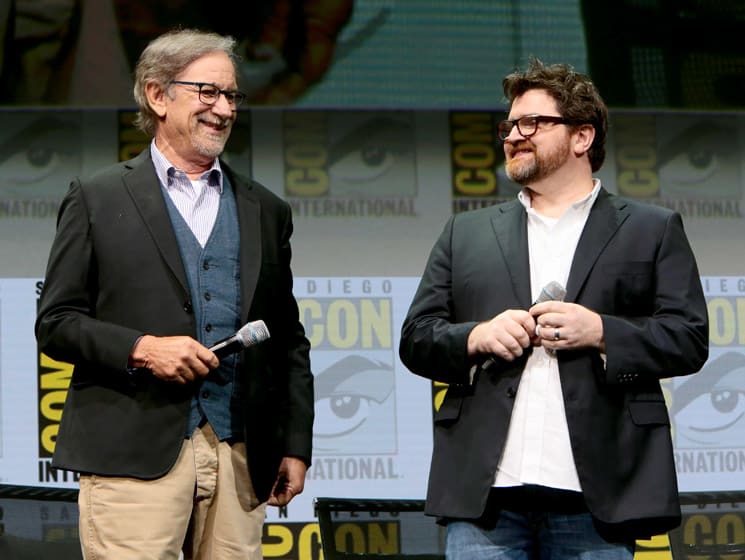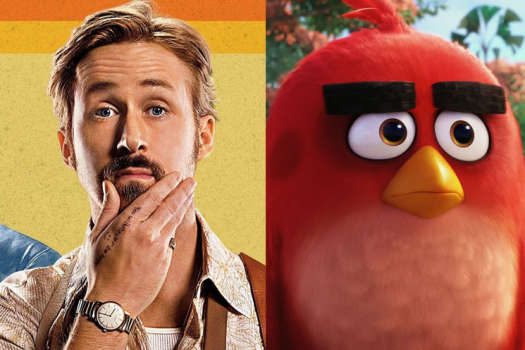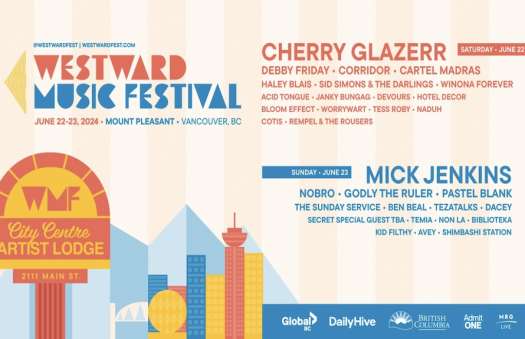Ernest Cline is living every nerd's dream.
The self-proclaimed fanboy, who grew up in the '80s on a steady diet of science fiction, fantasy and action films, is now rubbing shoulders with his pop culture heroes, thanks to the success of his debut novel Ready Player One. The best-selling 2011 novel, which depicts a treasure hunt through a massive virtual reality world, is laden with references to the pop culture of Cline's youth, with elements from the likes of Dungeons & Dragons, Pac-Man and Monty Python and the Holy Grail playing significant roles in the story.
The big screen adaptation, hitting theatres March 29, has already set fans on a treasure hunt of their own, parsing through the trailers frame-by-frame in search of references. The first trailer alone contains references to over two dozen iconic films, videogames and comic books, ranging from the iconic DeLorean from Back to the Future to blink-and-you'll-miss-'em cameos from the Joker, Tomb Raider's Lara Croft and the titular Iron Giant.
Ready Player One is part of a larger trend of '80s nostalgia, with Netflix's sci-fi homage Stranger Things, the Blade Runner sequel and the big-screen adaptation of Stephen King's It all recently whetting the collective cultural appetite for the decade's iconic look and feel.
While Cline is aware that the wave of nostalgia is inevitable once the children of an era grow up to become writers and creative types themselves, he believes that there's a deeper reason why this particular period is striking a chord, especially with today's technology-addled audiences. "I feel like that's the decade where we stepped onto the paths that we're still on now. The information age!"
The 1970s and early '80s marked the advent of videogames, home computing and the VCR, all of which irrevocably changed the way people create and consume information and entertainment. But of those inventions, it's the VCR that Cline believes most impacted him and other creators.
"Without VCRs, there's no Quentin Tarantino, there's no Paul Thomas Anderson, there's no Ready Player One. If I hadn't had access to this technology where I could watch movies over and over again, and watch movies that had never come to the theatres in my town or my country. Being able to watch anime and be exposed to all this Japanese pop culture that had never been released over here, all of that makes me nostalgic for the '80s and makes me view it as the birthplace of this modern era that we live in now."
The era also birthed the modern blockbuster, to which the film adaptation of Ready Player One plays significant homage. Says Cline, "The golden age of cinema was the invention of the blockbuster between Star Wars and Jaws, and then this golden age of action-adventure movies throughout the '80s, where kids could do anything. Movies like The Goonies or The Last Starfighter."
Cline's career so far has taken the idea of "kids could do anything" to its geekiest inevitability. Each of his works focuses on a young kid with a proclivity for pop culture, who utilizes their wealth of knowledge in pursuit of greatness, whether with the hapless Star Wars obsessives of his debut screenplay Fanboys or his protagonist from second novel Armada, a skilled gamer recruited by the military to defend Earth from actual space invaders.
Cline's protagonists are easy stand-ins for the author himself, who, similarly to his characters, has used his obsessive knowledge to ascend to the heights of his heroes, among them Steven Spielberg. After an early draft of Cline's Ready Player One screenplay caught the legend's eye, the director of Jaws, E.T. and the Indiana Jones films chose to lend his directing talents to Ready Player One.
"It would've been a different book had I not grown up watching his movies, especially the Indiana Jones films, which were a huge influence on Ready Player One," says Cline of Spielberg. "He kind of invented the blockbuster, and I'm paying tribute to a lot of the movies that came out in the '80s that helped define my own love of cinema and to be a writer. Having him visualize my story was just perfect."
While many adapted properties are filtered heavily through the Hollywood machine, Spielberg fought to ensure that the Ready Player One film stayed true to its source material. It helped that Spielberg was a fan of the book. Says Cline, "I saw his copy of Ready Player One, this dog-eared paperback full of post-it notes, when I visited the set of the movie. He referenced it all the time, had us rewrite certain scenes or had [co-screenwriter] Zak [Penn] rewrite certain scenes. He would just take pictures of pages from the book on his phone and say, 'Here, duplicate this exact thing in the screenplay.'
"That was the best thing that could ever happen, to have one of your favourite filmmakers be a huge fan of the source material and want to make [the film] as faithful as possible while also making it cinematic."
And while Cline admits that he still geeks out every time he gets to interact with Spielberg, he notes that working with the director has reminded him that the two aren't so different after all.
"He's a geek too!" says Cline excitedly. "He geeks out on his favourite movies and loves talking about movies. You know how it is: You meet somebody who loves cinema and loves things that you do, you have an instant connection. He's that kind of guy, he loves '80s movies too. Stuff that he wasn't involved in at all, he's a huge fan of it. It was fun watching him get to pay tribute to his favourite filmmakers, sneak stuff in that helped inspire him and pay tribute to the influences of this movie."
Ready Player One opens across Canada on March 29.
The self-proclaimed fanboy, who grew up in the '80s on a steady diet of science fiction, fantasy and action films, is now rubbing shoulders with his pop culture heroes, thanks to the success of his debut novel Ready Player One. The best-selling 2011 novel, which depicts a treasure hunt through a massive virtual reality world, is laden with references to the pop culture of Cline's youth, with elements from the likes of Dungeons & Dragons, Pac-Man and Monty Python and the Holy Grail playing significant roles in the story.
The big screen adaptation, hitting theatres March 29, has already set fans on a treasure hunt of their own, parsing through the trailers frame-by-frame in search of references. The first trailer alone contains references to over two dozen iconic films, videogames and comic books, ranging from the iconic DeLorean from Back to the Future to blink-and-you'll-miss-'em cameos from the Joker, Tomb Raider's Lara Croft and the titular Iron Giant.
Ready Player One is part of a larger trend of '80s nostalgia, with Netflix's sci-fi homage Stranger Things, the Blade Runner sequel and the big-screen adaptation of Stephen King's It all recently whetting the collective cultural appetite for the decade's iconic look and feel.
While Cline is aware that the wave of nostalgia is inevitable once the children of an era grow up to become writers and creative types themselves, he believes that there's a deeper reason why this particular period is striking a chord, especially with today's technology-addled audiences. "I feel like that's the decade where we stepped onto the paths that we're still on now. The information age!"
The 1970s and early '80s marked the advent of videogames, home computing and the VCR, all of which irrevocably changed the way people create and consume information and entertainment. But of those inventions, it's the VCR that Cline believes most impacted him and other creators.
"Without VCRs, there's no Quentin Tarantino, there's no Paul Thomas Anderson, there's no Ready Player One. If I hadn't had access to this technology where I could watch movies over and over again, and watch movies that had never come to the theatres in my town or my country. Being able to watch anime and be exposed to all this Japanese pop culture that had never been released over here, all of that makes me nostalgic for the '80s and makes me view it as the birthplace of this modern era that we live in now."
The era also birthed the modern blockbuster, to which the film adaptation of Ready Player One plays significant homage. Says Cline, "The golden age of cinema was the invention of the blockbuster between Star Wars and Jaws, and then this golden age of action-adventure movies throughout the '80s, where kids could do anything. Movies like The Goonies or The Last Starfighter."
Cline's career so far has taken the idea of "kids could do anything" to its geekiest inevitability. Each of his works focuses on a young kid with a proclivity for pop culture, who utilizes their wealth of knowledge in pursuit of greatness, whether with the hapless Star Wars obsessives of his debut screenplay Fanboys or his protagonist from second novel Armada, a skilled gamer recruited by the military to defend Earth from actual space invaders.
Cline's protagonists are easy stand-ins for the author himself, who, similarly to his characters, has used his obsessive knowledge to ascend to the heights of his heroes, among them Steven Spielberg. After an early draft of Cline's Ready Player One screenplay caught the legend's eye, the director of Jaws, E.T. and the Indiana Jones films chose to lend his directing talents to Ready Player One.
"It would've been a different book had I not grown up watching his movies, especially the Indiana Jones films, which were a huge influence on Ready Player One," says Cline of Spielberg. "He kind of invented the blockbuster, and I'm paying tribute to a lot of the movies that came out in the '80s that helped define my own love of cinema and to be a writer. Having him visualize my story was just perfect."
While many adapted properties are filtered heavily through the Hollywood machine, Spielberg fought to ensure that the Ready Player One film stayed true to its source material. It helped that Spielberg was a fan of the book. Says Cline, "I saw his copy of Ready Player One, this dog-eared paperback full of post-it notes, when I visited the set of the movie. He referenced it all the time, had us rewrite certain scenes or had [co-screenwriter] Zak [Penn] rewrite certain scenes. He would just take pictures of pages from the book on his phone and say, 'Here, duplicate this exact thing in the screenplay.'
"That was the best thing that could ever happen, to have one of your favourite filmmakers be a huge fan of the source material and want to make [the film] as faithful as possible while also making it cinematic."
And while Cline admits that he still geeks out every time he gets to interact with Spielberg, he notes that working with the director has reminded him that the two aren't so different after all.
"He's a geek too!" says Cline excitedly. "He geeks out on his favourite movies and loves talking about movies. You know how it is: You meet somebody who loves cinema and loves things that you do, you have an instant connection. He's that kind of guy, he loves '80s movies too. Stuff that he wasn't involved in at all, he's a huge fan of it. It was fun watching him get to pay tribute to his favourite filmmakers, sneak stuff in that helped inspire him and pay tribute to the influences of this movie."
Ready Player One opens across Canada on March 29.




